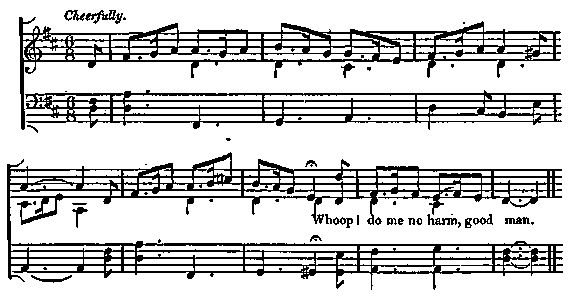Popular Music Of The Olden Time Vol 1
Ancient Songs, Ballads, & Dance Tunes, Sheet Music & Lyrics - online book
| Share page | Visit Us On FB |
|
208 |
ENGLISH SONG AND BALLAD MUSIC |
||
|
|
|||
|
He sigh'd in his singing, and made a great moan, Sing, &c.; I am dead to all pleasure, my true love he is gone, &c.
The mute hird sat by him was made tame by his moans, &c.;
The true tears fell from him would have melted the stones, Sing, &c.
Come, all you forsaken, and mourn you with me, Sing, &c.; Who speaks of a false love, mine's falser than she, &c.
Let love no more boast her in palace nor bower, Sing, &c.; It buds, but it blasteth ere it be a flower, &c.
Though fair, and more false, I die with thy wound, Sing, &c.; Thou hast lost the truest lover that goes upon the ground, &c.
Let nobody chide her, her scorns I approve [though I prove] ; She was born to be false, and I to die for her love, &c.
Take this for my farewell and latest adieu, Sing, &c.; Write this on my tomb, that in love I was true, &c.
The above copy of the words is from the same manuscript as the music. It differs from that in Percy's Beliques of Ancient Poetry; and Shakespeare has somewhat varied it to apply to a female character. |
|||
|
WHOOP! DO ME NO HARM, GOOD MAN.
This is twice alluded to by Shakespeare, in act iv., sc. 3, of A Winter's Tale; and by Ford, in act iii., sc. 3, of The Fancies cliaste and noble, where Secco, applying it to Morosa, sings " Whoop! do me no harm, good woman."
The tune was transcribed by Dr. Kimbault, from a MS. volume of virginal music, in the possession of the late John Holmes, Esq., of Retford. A song with this burden will bo found in Fry's Ancient Poetry, but it would not be desirable for republication. |
|||
|
|
|||
 |
|||